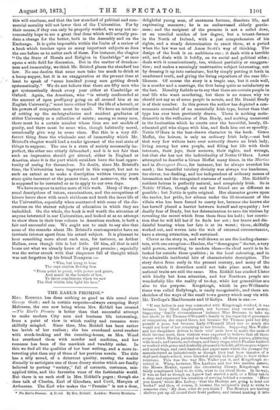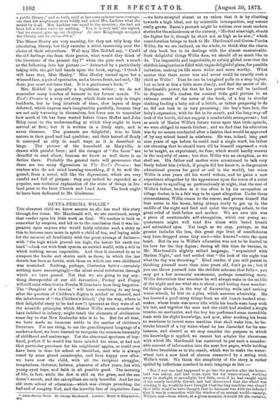THE EARL'S PROMISE.* MRS. RIDDELL has done nothing so good
as this novel since George Geith; and in certain respects—always excepting Beryl Molozane, the one new being whom Mrs. Riddell has created —The Earl's Promise is better than that successful attempt to make modern City men and business life interesting, from a point of view in which reality and romance were skilfully mingled. Since then, Mrs. Riddell has been rather too lavish of her realism ; she has overdosed novel-readers with stock-broking and the counting-house, as Mrs. Wood has overdosed them with murder and medicine, and her romance has been of the mawkish and twaddly order. In this we find all the qualities of her best writing, and a more in- teresting plot than any of those of her previous novels. The title has a silly sound, of a deterrent quality, causing the reader dismally to anticipate one of those dreary stories which are fondly believed to portray "society," full of coronets, costumes, mis- applied titles, and the favourite vices of the fashionable world. But there is no such stuff in Mrs. Riddell's pages ; though she does talk of Charles, Earl of Gleudare, and Cecil, Marquis of Ardmorne. The Earl who makes the "Promise" is not a dear,
* The Earl's Promise. A Novel. By Mrs. Riddell. London: Tinsley Brothers. delightful young man, of enormous fortune, dissolute life, and captivating manners ; be is an embarrassed elderly gentle- man ; and the recipient of the promise is not a soiled dove, or an unsoiled maiden of low degree, but a tenant-farmer in the North of Ireland, with a just comprehension of his. rights, and a steady determination to exact them, at a period when the law was not of Amos Scott's way of thinking. The, design of the book is an ambitious one ; it deals with a terrible evil, and deals with it boldly, on its social and political sides deals with it conscientiously, too, without partiality or exaggera- tion; and makes a seemingly unattractive subject interesting, not by dressing it up into caricature, but by simply putting it forth in unadorned truth, and giving the living expositors of the case life- likeness. Of course the story is a tragic one, but it ends well, in a murder and a marriage, the first being quite as satisfactory as the last. Morality forbids us to say that there are certain people in real life who want murdering, but there is no reason why we should not say so of some people in novels, and Mr. Daniel Brady is of their number. In this person the author has depicted a con- summate scoundrel of an essentially Irish type, better than that type has ever been previously drawn. There is nothing melo- dramatic in the ruffianism of Dan Brady, and nothing unnatural in the fascination which he exerts over the beautiful, lonely, ill- educated girl who elopes with him, and finds him out so speedily. Nettie O'Hara is the best-drawn character in the book. Grace Moffat, the heiress, is only an ordinary Irish lady,—not but that very few writers have ever correctly drawn an Irish lady,. living among her own people, and filling her life with their interests, their, joys, their sorrows, their rights, and wrongs,. but that she has not the individuality of Nettie O'Hara. Lever attempted to describe a Grace Moffat many times, in the Martins and in Davenport Dunn, for instance, but he always overshot his mark ; the beautiful tutelary divinity was always too handsome, too clever, too dashing, and too independent of ordinary means of locomotion and the recognised customs of society. Mrs. Riddell's resident heiress is perfectly natural, and completely Irish. So is. Nettie O'Hara, though she and her friend are as different as. possible ; but Nettie is quite original. Her character grows upon the reader, her pride, her silence under the ill-treatment of the villain who has been forced to marry her, because she knows sim- iles herself placed a barrier between herself and sympathy ; her deadly fear of Brady, but her determination to save his victims by revealing the secret which frees them from his hold ; her convic- tion that he will kill her if he finds her out ; her brave and dis- dainful bearing when her fate is at its worst; these, skilfully worked out, and woven into the web of external circumstances, have a strong attraction, well sustained.
Clever as the story is, and well drawn as are the leading charac- ters, with one exception—Hanlon, the " demagogue " doctor, a very mild person, according to modern ideas—its chief merit is to be looked for outside these qualities ; in the local colouring, and ii. the admirable incidental bits of characteristic description. The story dates from early in the present century, and many of the scenes which it describes could not take place now, but the- national traits are still the same. Mrs. Riddell has studied Ulster with kindly but keen attention, and her Northern people are- wonderfully like the reality of to-day, while her generalities are also to the purpose. Kingslough, which in pre-Williamite times was called Ballylough, is easily recognisable, and there are sketches of the ways of the small town gentry which may vie with Mr. Trollope's MacDermots and O'Kellys. Here is one :—
"If any ladies in any way connected with Kingslough worked, it was because they liked employment, not because they earned money_ Supposing family circumstances' induced Miss Brennan to take up her abode in Sir Thomas O'Donnell's family in the capacity of governess or companion, she stayed there, not because Sir Thomas paid her fifty pounds a year, but because Lady O'Donnell liked her so much she would not hear of her returning to her friends. Supposing Mrs. Waller and her daughters driven to their wits' ends how to make the ends of their income meet, then visitors were expected to believe that all those- scones which Martha painted so beautifully ; all those purses, glittering with beads, and tassels, and clasps, and fancy rings, which Pauline knitted. or worked with grace and dexterity pleasant to behold; all those pen-wipers and scent-bags, and card-baskets, and paper mats which the younger fry manufactured as industriously as though they had been inmates of a. deaf-and-dumb-school, were intended merely as free gifts to their richer relations. This was tho way Mrs. Waller put it, and Kingslough re- ceived it. When, however, Mrs. Larkins and her two maiden sisters, the Misses Healey, opened the circulating library, Kingslough was fairly nonplussed what to do with, what to say about them. In its way, it was as bad as though an Agnew had started a mill, or a Riley taken a shop and expressed his intention of serving behind a counter. 'Have you heard,' wrote Mrs. Lefroy, that the Healeys are going to lend out. books?' and then, of course, it became the recipient's duty to write to someone else,' 'My dear, what do you think ? The Healeys are having shelves put up all round their front parlour, and intend making it into a public library;" and so forth, until at last some spinster more courage- ous than her neighbours went boldly and asked Mrs. Larkins what she meant by it alL Mrs. Larkins was equal to the occasion ; she had not been left a widow twice for nothing. 'Yes, it is very sad,' she sighed, ' but we cannot give up our charities.' At once Kingslough accepted the library, and its raison d'être."
The Misses Healey are very amusing, for they not only keep the circulating library, but they exercise a strict censorship over the choice of their subscribers. Well may Mrs. Riddell say, " Could the old darlings rise from their graves, what would they think of the literature of the present day?" when she puts such a touch as the following into her picture :—" Attracted by a particularly taking title, the girl laid hands upon the book, saying, 'I think I will have that, Miss Healey.' Miss Healey turned upon her a wizened face, a pair of spectacles, and a brown front, and said, My dear, you must not have that. It is a gentleman's book.'" Mrs. Riddell is generally a lugubrious writer ; we do not remember many touches of humour in her former novels. The Earl's Promise is a very sad story, which deals not only in tragic incidents, but in long intervals of time, slow lapses of hope deferred, which impress one's imagination painfully, because they are not only torturing in themselves, but force one to remember bow much of life has been wasted before Grace Moffat and John Riley come to the understanding at which they ought to have arrived at first; but it is written in a lively style, and is never tiresome. The peasants are delightful ; true to Irish nature in their good and bad qualities ; and their hatred of Brady is conveyed as ably In small ways as it is described in large. The picture of the household at Maryville, is -drawn with painful force ; and the ravages of "the fever" are dreadful to read about, because we know so well there is no fiction there. Probably the general taste will pronounce that there are too many digressions in The Earl's Promise : but readers who do not mind learning something, if it be well dis- guised, from a novel, will like the digressions, which are very -careful and full of purpose : they may indeed be regarded as a popular, non-technical explanation of the state of things in Ire- land prior to the Irish Church and Land Acts. The book ought to have been dedicated to Mr. Gladstone.































 Previous page
Previous page